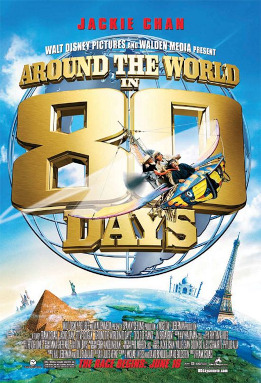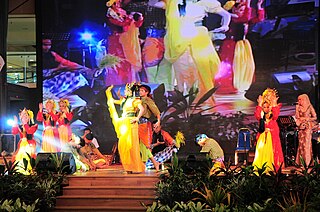
Around the World in Eighty Days is an adventure novel by the French writer Jules Verne, first published in French in 1872. In the story, Phileas Fogg of London and his newly employed French valet Passepartout attempt to circumnavigate the world in 80 days on a wager of £20,000 set by his friends at the Reform Club. It is one of Verne's most acclaimed works.

Sati or suttee is a Hindu practice in which a widow should sacrifice herself by sitting atop her deceased husband's funeral pyre. It has been linked to related Hindu practice in regions of the Indian subcontinent. Sati appears in some post-Vedic Hindu texts as an entirely voluntary and optional practice. Greek sources from around c. 300 BCE make isolated mention of sati, but it likely developed into a real fire sacrifice in the medieval era within northwestern Rajput clans to which it initially remained limited, to become more widespread during the late medieval era.

Around the World in 80 Days is a 2004 American action adventure comedy film based on Jules Verne's 1873 novel of the same name and remake of the movie of the same name of 1956. It stars Jackie Chan, Steve Coogan, Cécile de France and Jim Broadbent. The film is set in the nineteenth century and centers on Phileas Fogg (Coogan), here reimagined as an eccentric inventor, and his efforts to circumnavigate the globe in 80 days. During the trip, he is accompanied by his Chinese valet, Passepartout (Chan). For comedic reasons, the film intentionally deviated wildly from the novel and included a number of anachronistic elements. With production costs of about $110 million and estimated marketing costs of $30 million, it earned $24 million at the U.S. box office and $48 million worldwide, making it a box office failure. It also received generally negative reviews from critics, mainly for lacking similarities to the original book.

Phileas Fogg is the protagonist in the 1872 Jules Verne novel Around the World in Eighty Days. Inspirations for the character were the American entrepreneur George Francis Train and American writer and adventurer William Perry Fogg.

Around the World in 80 Days is a 1956 American epic adventure-comedy film starring David Niven, Cantinflas, Robert Newton and Shirley MacLaine, produced by the Michael Todd Company and released by United Artists.

Around the World in 80 Days with Michael Palin is a 7-part BBC television travel series first broadcast on BBC1 in 1989, and presented by comedian and actor Michael Palin. Inspired by Jules Verne's classic 1873 novel Around the World in Eighty Days, in which a character named Phileas Fogg accepts a wager to circumnavigate the globe in eighty days or less, Palin takes on the same task, prohibited from using aircraft in order to use a combination of trains, boats and other forms of transport, to take him across several countries around his circumnaviation of the world, including Italy, Egypt, China, Japan, and the United States.

Around the World with Willy Fog is a Spanish animated television adaptation of the 1873 novel Around the World in Eighty Days by Jules Verne produced by Spanish studio BRB Internacional and Televisión Española, with animation by Japanese studio Nippon Animation, that was first broadcast on TVE1 weekly between 8 January and 15 July 1984.
Melora Harte is an American voice actress. In addition to voice acting in anime, she also adapted and directed several anime dubs. Her husband, Steve Kramer, is also a voice actor.

Jean Passepartout is a fictional character in Jules Verne's novel Around the World in Eighty Days, published in 1873. He is the French valet of the novel's English main character, Phileas Fogg. His surname translates literally to "goes everywhere", but “passepartout” is also an idiom meaning "skeleton key" in French. It can also be understood as a play on the English word passport—or its French equivalent passeport.

The Other Log of Phileas Fogg is a science fiction novel written by American author Philip José Farmer in 1973. Reviving the Phileas Fogg character created by Jules Verne, the novel has also been classified as steampunk and a parallel novel. It was originally published by DAW Books and later reprinted in 1979 by Hamlyn and again in 1982 by Tor Books. Tor has subsequently reissued the novel in 1988 and 1993.

Around the World in 80 Days is a three-part television miniseries originally broadcast on NBC from April 16 to 18, 1989. The production garnered three nominations for Emmy awards that year. The teleplay by John Gay is based on the 1873 Jules Verne novel of the same title.

Around the World in 80 Days is a 1988 Australian 49-minute direct-to-video animated film from Burbank Films Australia. The film is based on Jules Verne's classic French novel, Around the World in 80 Days, first published in 1872, and was adapted by Leonard Lee.

Ulek mayang is a classical Malay dance from the state of Terengganu in Malaysia. It is a ritualistic dance performed to appease or invoke the spirits of the sea and is always accompanied by a unique song also called Ulek Mayang. An orchestra comprising drums, gong, violin and accordion accompanies the dance.
Around the World in Eighty Days is an animated television series that lasted one season of 16 episodes, broadcast during the 1972–1973 season by NBC. It was the first Australian-produced cartoon to be shown on American network television. Leif Gram directed all 16 episodes, and the stories were loosely adapted by Chester "Chet" Stover from the 1873 novel by Jules Verne.
Bahaghara is a wedding ceremony performed by Odia Hindu people in the Indian state of Odisha. There are subtle differences in the rites observed by different castes. In Odia marriage rituals, the mother of the bridegroom does not take part in the ceremony. The Utkala Brahmins have their weddings only in the daytime, preferably at midday or in the morning, while the other caste weddings are done during the evening or night. There is the custom of sending betel nuts to family friends for inviting them to the marriage. The first invitation is sent to the family deity as a respect to the lord. Marriages in Odisha are mostly fixed and arranged by the parents. Marriages for serving or capturing is not common.

Around the World in Eighty Days is a 1919 German silent adventure comedy film, directed and produced by Richard Oswald and starring Conrad Veidt, Anita Berber, and Reinhold Schünzel. It is based on the 1873 Jules Verne novel Around the World in Eighty Days. It premiered at the Marmorhaus in Berlin.

Willy Fog 2 is a Spanish animated television adaptation of the novels Journey to the Center of the Earth and Twenty Thousand Leagues Under the Seas by Jules Verne, with the characters from Around the World with Willy Fog, produced by Spanish studio BRB Internacional and Televisión Española that was first broadcast on La 2 between 24 September 1994 and January 1995.

Around the World in 80 Days is a historical drama adventure television series based on the 1872 Jules Verne novel of the same name, in which, for a bet, Phileas Fogg travels the world in 80 days by various means both traditional and new. It was commissioned by the European Alliance, a co-production alliance of France Télévisions, ZDF of Germany, and RAI of Italy, with additional co-production partners of Masterpiece (US) and Be-Films/RTBF (Belgium). It was produced in the UK, France and South Africa, with filming also taking place in Romania. The series first premiered on La Une in Belgium, on 5 December 2021, and later on BBC One in the United Kingdom on 26 December 2021. In November 2021, ahead of the premiere, it was announced the programme had been renewed for a second season. However, there has been no further announcement since.

Around the World in 80 Days is a 2021 French-language animated adventure comedy film based on Jules Verne's 1873 novel of the same name. Directed by Samuel Tourneux from a screenplay by Gerry Swallow and David Michel, the film was produced by Cottonwood Media and distributed by StudioCanal. Around the World in 80 Days was released in France on 4 August 2021, and had a worldwide gross of $3.987 million. Grossing €3.7 million ($4,375,990) from 762,917 admissions, it was the highest-grossing French-language film in foreign markets of 2021.
















